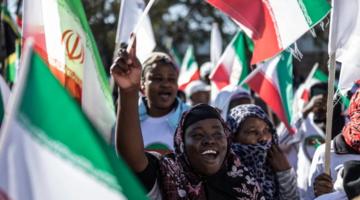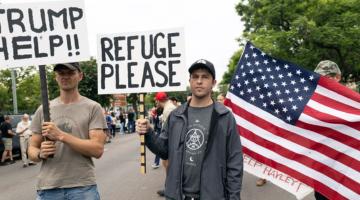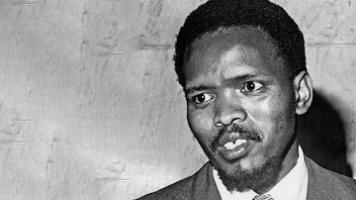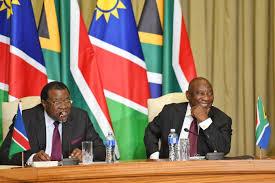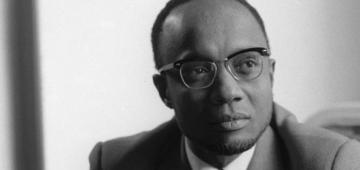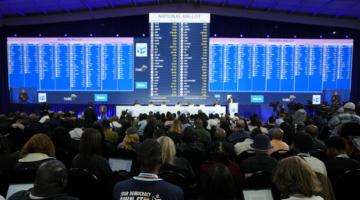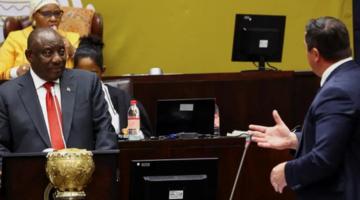Lessons for Palestine from South African Women in the struggle against apartheid.
On November 21, 2023, South Africa’s Parliament voted in favor of a motion calling for the suspension of diplomatic ties with the zionist entity (Israel) and the closure of its embassy in the country. The resolution was proposed by the leftist opposition party, Economic Freedom Fighters (EFF), but was backed by the ruling African National Congress (ANC). Of course, the right-wing, mostly-white Democratic Alliance voted against the resolution, favoring instead apartheid and genocide. While it is not yet clear that South Africa’s president, Cyril Ramaphosa, will implement the resolution, it is a significant position by an African state.
South Africa, of course, knows what the Palestinians are suffering. They know apartheid. The National Union of Metalworkers of South Africa (NUMSA) said as much when they issued a statement in support of the resolution, calling for the entire African continent to stand in solidarity with Palestine:
…because we can relate to their suffering. We know what it is like to be enslaved, colonized, stripped of dignity, and to be denied our humanity, simply on the basis of race. We are still victims of the daily violence of racist and colonial capitalism and its capacity to manufacture human suffering.
There is, also, a longer history here. For instance, in 1972, hundreds of women gathered in Dar-es-Salaam for the All-African Women’s Conference. One of the objectives of the conference was to discuss (and celebrate) women’s role in liberation struggles against colonialism, neo-colonialism, imperialism, and underdevelopment. Key to this was a resolution to fully support African freedom fighters in the fight against apartheid in South Africa.
As participants in the conference, the Women’s Section of the African National Congress, presented a paper on the struggle of women against apartheid. In their paper, they define apartheid and explain its main goals of dispossession, exploitation, and the relegation of the indigenous people–who constitute more than two-thirds of the total population of the country–to the level of slaves. They enumerate the key structures of apartheid: the destruction of indigenous property, their removal from their traditional lands to reserves (“Bantustans”) and resettlement camps, the establishment of pass laws, and the turning of the population into cheap labor. Significantly, the paper focuses on the experiences of South African women within apartheid, arguing, “Black women in South Africa are not accorded special privileges or treatment by the white oppressors. They are subjected to the same treatment as their menfolk.” Black South African women were also key to the anti-apartheid struggle.
We reprint the paper by the Women’s Section of the African National Congress below. South Africans, as victims of racist apartheid, have a keen understanding of the system and they, more than any other group, understand the Palestinian struggle. We saw the downfall of apartheid. May we see the end of zionism and western imperialism. And the liberation of Palestine.
SOUTH AFRICAN WOMEN AGAINST APARTHEID
Women’s Section, African National Congress, Dar es Salaam, Tanzania, 1972
Apartheid or Separate Development as the South African racists would like it termed, is a declared policy of the white minority regime of South Africa. The main objective of this abominable policy is to continue holding the Black people of our country in subjugation denying them political, economic and social rights. The indigenous people who constitute more than two-thirds of the total population of the country have been relegated to the level of slaves.
The country is rich and industrially developed, but all the riches and wealth of the country are in the hands of the white minority. This wealth is produced through the ruthless exploitation of the Black people with the African being the most exploited, oppressed and humiliated in the country of his birth.
Threat To Peace In Africa
The conditions of life of the 18 million black people under the apartheid white minority domination continue to deteriorate. The racist Government of Vorster with its apartheid policy has arrogated to itself the role of protecting and maintaining this system which continue to pose a grave threat to peace and security in Africa and the world. The methods employed by the regime inside the country to arrest the rising tide of our struggle are reminiscent of Nazi Germany. Our country has become a fully fledged police state. The racist regime brooks no opposition to its inhumane policies.
Our people are being moved from their homes and from the areas declared "White" by the racists. They are being thrown into barren areas - areas not fit for human habitation. This continuing policy of mass removals which has already affected more than one million people has caused untold suffering to the Black people.
While the white population's wealth is continuing to grow unemployment, disease and destitution among the Africans have increased sharply. The reserves, Bantustans and the resettlement camps have become reservoirs of cheap labour. Pass laws, being the cornerstone of our oppression, continue to be a means for forcible direction of African labour. It is worth noting that 87 per cent of the land of our country has been given to the White minority population while the Black people who constitute more than two-thirds of the total population of our country occupy, only thirteen per cent.
Cheapest Labour
In order to understand and appreciate the contribution and the role of the oppressed and struggling women of South Africa, one has to view it in the broad general context of our liberation struggle. The Black women in South Africa are not accorded special privileges or treatment by the white oppressors. They are subjected to the same treatment as their menfolk. In fact they serve as the cheapest labour force compared to men for equal work. Seventy-three per cent (73 %) of African women remain in the Reserves cultivating the families' tiny plots, while their husbands work as migrant labourers. But the pitiful small returns force the majority to work under feudal conditions on white farms or as domestic servants.
Only 27 per cent of them can find jobs in the cities as rigorous controls exist to keep them out. Those permitted to live on the employers' premises are liable, like those who live in locations to be disturbed by police raids in the night. And if the employer permitted it, it is illegal for a husband to spend a night in his wife's room.
The only thing not forbidden is the servant's right to love a white child though it will not grow up to treat her like a mother.
Apart from domestic and field work there are few openings for women. Mainly due to economic exploitation, only 0.1 per cent can manage to get secondary education. As a result there are very few African lawyers and university lecturers. Women doctors are rare. Typists, telephone operators and shop assistants are being barred by terms of the Job Reservation Act which seeks to create facilities only to white women in such positions.
The plight of wives and mothers of prisoners is even more tragic. They suffer fear, loneliness, destitution and despair.
"Our women are a rock" is a theme of an African freedom song and as the struggle mounts in heat and intensity more and more women are joining the ranks.
The women of South Africa have never remained indifferent to the oppression and exploitation of our people. They have always played a prominent role in our liberation struggle.
History of Women's Struggle
Their history of struggle dates as far back as 1897 - but then only as individuals. The birth of Pan Africanism found women in its midst. When the Black radicals from the West Indies met in London to form an Association, Miss "Kincoln", an African woman from South Africa was elected treasurer of the Association. The following year (1898) she returned to South Africa.
When the African National Congress was founded in 1912, Charlotte Maxeke, the first African woman medical doctor in South Africa was the first woman to serve in its National Executive. Her presence in the Executive of the ANC became a source of inspiration to the women of our country. It instilled confidence in them and spurred the African women in the Orange Free State (one of the Provinces of South Africa) in 1913 to throw in their full weight in the fight against the extension of passes to them by the racist regime. This anti-pass campaign was launched under the guidance of the African National Congress. The first organised action was by women who assembled at the Administrative Offices in one place and made bonfires out of the passes. The campaign grew and spread to various parts of the Province. The government was left with no other alternative but to abandon its ill intentions. The idea of extending passes to the women was temporarily abandoned. Each successive government made attempts to impose passes on women, but in each case the attempt met with militant opposition from the women in our country.
Since 1913 there have been many anti-pass revolts, some big, some small. Many were unorganised. As our struggle developed, so did the political consciousness of our people, including women. This made our people realise the important role women could play in our liberation struggle; it made them understand the true character and content of our struggle.
Thus in 1943 the African National Congress had noted with satisfaction the need to have an organised body of women. In 1948 the African National Congress Women's League was officially inaugurated at the Bloemfontein Conference of the ANC. Its first President was Miss Ida Mtwano. Since its inception until the banning of the ANC in 1960, the Women's League always worked on a definite programme of activities, besides tackling the problems of a society mad with racism. Regional conferences were held annually; Provincial ones every third year and the National Conferences were held after every five years to plan new strategies, adopt resolutions and elect new office bearers.
S.A. Women's Day
March 8 has always been observed by the South African women together with the progressive women all over the world as International Women's Day and August 9 as South Africa's Women's Day. August 9, 1956 was the culmination of many years of struggle by the women of South Africa: it was born in the heat of the struggle. The African National Congress Women's League was a founder-member of the Federation of South African Women and played a leading role in all its activities. When the Federation was formed in 1954, it had already become crystal clear that in the struggle against apartheid, white domination and oppression the role of women had assumed a dynamic character and that their struggle was inseparable from the overall, nationwide struggle for freedom. The same year, 1954, the Federation of South African Women affiliated to the Women's International Democratic Federation. Many militant struggles were conducted by the women of South Africa against the removal and dispossession of whole tribes and the banishment and deportation of patriotic chiefs,
Many of them were arrested for taking part in the 1952 Defiance Campaign which was launched by the African National Congress. Their role also stands out in the struggle against the Bantu Authorities Act in 1957 at Zeerust, Sekhukhuniland and Dinokane.
They also played no small role in the struggle against Bantu Education Act of 1954 which in the final analysis reduces our children to whiteman's slave, leaving them with no prospect of effective contribution in the society we are aspiring to build.
On 26th June, 1955 the Congress Alliance led by the ANC organised a multi-racial Congress which was held in Kliptown near Johannesburg. Other sister organisations were the South African Indian Congress, Coloured People's Congress and the Congress of Democrats (representing progressive whites). The Kliptown Congress adopted for the future democratic South Africa a programme which is known as the "Freedom Charter", This Charter has now become the recognised document of the United Nations “Unit on Apartheid”, as it embodies the fundamental human rights as set-out in the U.N. Charter. The fascist Government made every effort to break this historic meeting but failed through the determination of the gathering of the representatives of all racial groups of our country. The year following the adoption of the documents, 156 leaders of all races were arrested and charged with high treason. After four years of trial they were all acquitted. Families were broken and some died during the course of the prolonged trial. June 26 is observed inside and outside our country as South African Freedom Day and is recognised by the U.N. Both in the preparations for the historic Congress and during its deliberations, our women played no small role. They launched a house to house campaign collecting the people's demands.
20,000 Women March
The climax of the Women's campaign against unjust laws come on August 9 in 1956, when more than 20,000 women from all parts of our country and from all walks of life and of racial groups converged on the Union Buildings (Pretoria) to meet the then Prime Minister Strijdom in a protest against passes.
Fearing the disciplined but angry mood of the women the Prime Minister absented himself from his office. The women on the war-path were led by the President and Secretary-General of the Federation of South African women, Mrs Lilian Ngoyi and Helen Joseph respectively. Among the women representatives were teachers, nurses, factory workers, domestic workers and so on. The delegation of the Women headed by the President handed the Prime Minister's Secretary the petitions of grievances and demands signed by women all over the country with a word of protest that they swear that they would never rest until they have won a happy future for their children and the nation.
Police tried without success to prevent the women from getting to Pretoria. Since then, this day August 9 is known as South Africa' Womens Day. The mammoth demonstration intimidated the racist oppressors. Many women were detained on their way to Pretoria, some on their return.
In 1957 in the small town of Zeerust in the Western Transvaal another attempt was made by the Government to compel the women to carry passes. Realising that the women of this area were solidly against the measure, the police opened fire on a peaceful meeting which was convened to express disapproval. Many women were seriously injured and about 58 arrested. Later 51 had their charges withdrawn. Immediately after this incident the ANC suffered its first ban as an organisation in that particular Province.
In August 1959 women in Umzinto and Ixopo in Natal Province destroyed 75 per cent of dipping tanks. 113 were arrested and found guilty. Fine was £25 or three months in jail. As a result of the prolonged struggle by the women and continuous police provocation, in one month in the
Natal Province 600 women were in prison with fines totalling £13,000, alternatively 223 days in prison. In the same Province in Ixopo women were sentenced to four months in prison or £35 fine each. They all decided to serve the sentences rather than pay the fine out of the ANC funds. Addressing a protest meeting Chief Albert John Luthuli tabled the following grievances as a cause of women's protest and arrests:
- Removal of people from places they had built and demolition of their homes.
- Influx control and extension of passes to women and the refusal of permits to seek work in towns.
- Increase of rents for houses in locations and increased poll tax.
- New regulations regarding the filling of dipping tanks by women without pay and gathering people for resettlement schemes.
Less than £10 per month
According to figures related in the Survey of Race Relations (1958-59) in Cato Manor, Durban, the 1956 family incomes survey of Africans had shown that 61 percent of workers earned less than £10 per month. The families who were removed to other places had the extra burden of increased transport costs. Women could no longer afford to get part-time work. Opposition to the Government discriminatory laws increased.
In October 1958, in Johannesburg, South Africa, noted big demonstrations of African women against the extension of passes. The women of Sophiatown also played a big role in fighting against the removal of the township; they also initiated a big anti-pass demonstration where thousands were put in jail. In spite of protest and bitter fighting by our people the racists decided to use force in uprooting our people from the area and declaring it white. In support of their Sophiatown sisters against passes, the women in Alexandra township, which was also a free-hold land, staged their anti-pass demonstration and also met the same fate of mass arrests. Alexandra is today being removed to the slum areas of Soweto and barrack-like hostels for domestic workers are being built.
Recently (March) a big hostel for single women was completed in Alexondra. This hostel accommodates 2,834 single women. Its doors are electronically operated from the gate. In case of any trouble the fascists will use these doors to divide the whole hostel into three, locking all the people inside.
Rent (monthly)
25 residents share one bath
35 residents share one shower
20 residents share one basin
20 residents share one toilet
No family accommodation. The bathrooms are very small.
In 1957 when the tribe of Sekhukhuniland (Northern Transvaal) revolted against Bantu Authorities forced removals, Chieftainess Madinoge Kholokwe was among those sentenced to death for her role in the disturbances during which traitors and police were stoned to death for provoking the riot. She was reprieved and, was released on the 26th January, 1971, on parole after serving ten years in prison. Political prisoners do not benefit from parole: she was an exception as the fascists allege she was a criminal; to us she is a heroine.
In 1959 in Veeplants (Port Elizabeth) a team of pass officials came to issue passes to women. The women lined up as though they were going to accept them. Instead of taking them they started singing revolutionary songs chanting and shouting slogans. Many of them were arrested. Similar incidents took place in other parts of the country, e.g. Lady Selborne (Pretoria). During the same year, African women mobilised and organised a mass scale campaign to boycott the buying and selling of potatoes. Potatoes were being grown by white farmers on the basis of starvation wages and the use of convict labour. This Campaign was initiated by the ANC and the ANC Women's League played a leading role in it.
Banned, Jailed and Tortured
The first person to be placed under house arrest in South Africa was a woman, the Secretary of the Federation of South African Women, Mrs Helen Joseph.
Many of them such as Dorothy Nyembe are languishing in jail. Dorothy Nyembe is today serving 15 years in prison for furthering the aims of our struggle. Florence Matomela and many others were tortured to death in detention. She died upon her release. When the ANC embarked upon the armed struggle many women joined its military wing Umkhonto We Sizwe and underwent military training. They played no small role in Zimbabwe when the soldiers of the ZAPU-ANC engaged the fascist soldiers in Zimbabwe in 1967-68.
In 1969 five women were among the 22 Africans who faced charges under the Suppression of Communism Act and promoting the aims of the ANC. They were Winnie Mandela, Martha Dlamini, Joyce Sikhakhane, Virginia Mngoma and Rita Nzanga. These women were subjected to Nazi-type torture; being pulled by their hair, spending sleepless nights, standing on bricks during their detention. Shanthie Naidoo and Brysine Namkahla were in solitary confinement for almost a year sleeping on cement floor for refusing to give evidence against the accused.
Leaders and many cadres of our Women's organisation have been banned, restricted, house arrested, deported and others have been subjected to other forms of persecution.
Winnie Mandela is still a victim of persecution. Last month on the 13th June, 1972, among the four Indians who appeared in court charged under the notorious Terrorism Act there is a woman Mrs Amina Desai. The State alleges that they were preparing to distribute leaflets by bucket bombs similar to those distributed by the ANC in South Africa. They were also charged with furthering the aims of the African National Congress and the South African Communist Party.
The participation of the women in our struggle for freedom is growing daily. As our struggle develops more and more will join our ranks.
Source: “Women of Africa Meet... Report of All-African Women's Conference held in Dar- Es-Salaam,” Sechaba (November 1972).

